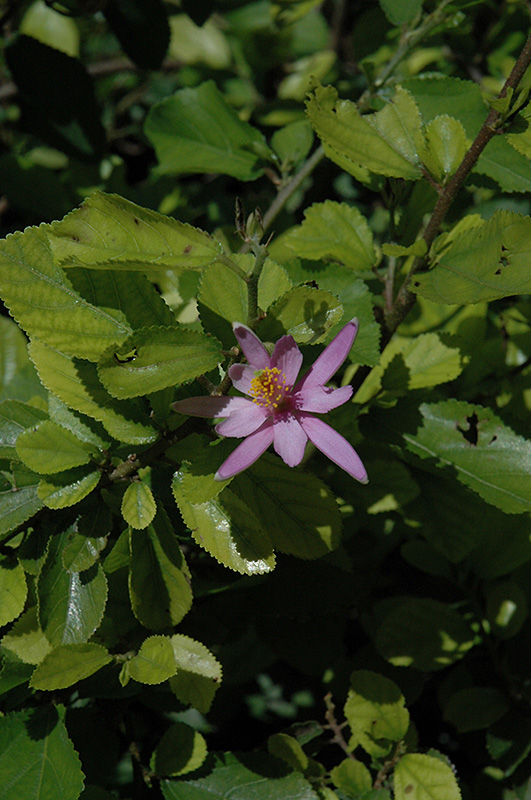Height: 10 feet Spread: 10 feet
Sunlight:
Hardiness Zone: 8b Other Names: Lavender Starflower, Grewia occidentalis Description: A large shrub producing star shaped lavender flowers nearly all year long; a good screening or windbreak plant, but also grows very well as a container plant; will tolerate only light frost Ornamental Features Lavender Star Flower features showy double lavender star-shaped flowers with gold eyes along the branches from early spring to late fall. It has dark green evergreen foliage which emerges chartreuse in spring. The serrated oval leaves remain dark green throughout the winter. Landscape Attributes Lavender Star Flower is a multi-stemmed evergreen shrub with an upright spreading habit of growth. Its average texture blends into the landscape, but can be balanced by one or two finer or coarser trees or shrubs for an effective composition. This is a relatively low maintenance shrub, and should only be pruned after flowering to avoid removing any of the current season's flowers. It has no significant negative characteristics. Lavender Star Flower is recommended for the following landscape applications; Planting & Growing Lavender Star Flower will grow to be about 10 feet tall at maturity, with a spread of 10 feet. It has a low canopy, and is suitable for planting under power lines. It grows at a medium rate, and under ideal conditions can be expected to live for 40 years or more. This shrub does best in full sun to partial shade. It prefers to grow in average to moist conditions, and shouldn't be allowed to dry out. It is not particular as to soil type or pH. It is somewhat tolerant of urban pollution. Consider applying a thick mulch around the root zone in winter to protect it in exposed locations or colder microclimates. This species is not originally from North America. Lavender Star Flower makes a fine choice for the outdoor landscape, but it is also well-suited for use in outdoor pots and containers. Its large size and upright habit of growth lend it for use as a solitary accent, or in a composition surrounded by smaller plants around the base and those that spill over the edges. It is even sizeable enough that it can be grown alone in a suitable container. Note that when grown in a container, it may not perform exactly as indicated on the tag - this is to be expected. Also note that when growing plants in outdoor containers and baskets, they may require more frequent waterings than they would in the yard or garden.![]()
![]()
![]()
![]()
![]()
![]()
![]()
![]()
![]()
![]()
top of page
Louie's Nursery Menifee - Plant Finder
Characteristics
Applications
Features & Attributes
This tool is an online resource representing many of the varieties that we carry over the course of the season, and is intended for informational purposes only. Inventory varies seasonally, so we cannot guarantee that every plant will be in stock at all times - please contact the store directly for current availability. It does not include our entire selection of plants, so be sure to visit our store to see varieties that may not be represented on this list.
bottom of page
